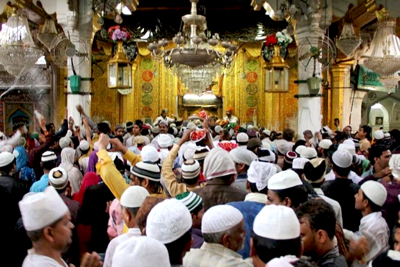Washington D.C., May 8: The prime time for brain development in a child's life is the first year, where the infant spends most of the time asleep. It is the time when neural connections form and sensory memories are encoded.
However, when sleep is disrupted, as occurs more often among children with autism, brain development may be affected, too.
New research led by the University of Washington finds that sleep problems in a baby's first 12 months may not only precede an autism diagnosis but also may be associated with altered growth trajectory in a key part of the brain, the hippocampus.
The study, which was published in the American Journal of Psychiatry, researchers report that in a sample of more than 400 taken of 6- to 12-month-old infants, those who were later diagnosed with autism were more likely to have had difficulty falling asleep.
It also states that this sleep difficulty was associated with altered growth trajectories in the hippocampus.
"The hippocampus is critical for learning and memory, and changes in the size of the hippocampus have been associated with poor sleep in adults and older children.
As many as 80 per cent of the children with autism spectrum disorder have sleep problems," said Annette Estes, director of the UW Autism Center and senior author of the study.
"In our clinical experience, parents have a lot of concerns about their children's sleep, and in our work on early autism intervention, we observed that sleep problems were holding children and families back," added Estes, who is also a UW professor of speech and hearing sciences.
"It could be that altered sleep is part-and-parcel of autism for some children. One clue is that behavioural interventions to improve sleep don't work for all children with autism, even when their parents are doing everything just right. This suggests that there may be a biological component to sleep problems for some children with autism," said Estes.
To consider links among sleep, brain development, and autism, researchers at the IBIS Network looked at MRI scans of 432 infants, surveyed parents about sleep patterns, and measured cognitive functioning using a standardized assessment.
At the outset of the study, infants were classified according to their risk for developing autism: Those who were at higher risk of developing autism -- about two-thirds of the study sample -- had an older sibling who had already been diagnosed.
Infant siblings of children with autism have a 20 per cent chance of developing autism spectrum disorder -- a much higher risk than children in the general population.
In the current study, 127 of the 432 infants were identified as "low risk" at the time the MRI scans were taken because they had no family history of autism.
They later evaluated all the participants at 24 months of age to determine whether they had developed autism. Of the roughly 300 children originally considered "high familial risk," 71 were diagnosed with autism spectrum disorder at that age.
Problems with sleep were more common among the infants later diagnosed with an autism spectrum disorder, as were larger hippocampi. No other subcortical brain structures were affected, including the amygdala, which is responsible for certain emotions and aspects of memory, or the thalamus, a signal transmitter from the spinal cord to the cerebral cortex.
The authors note that while parents reported more sleep difficulties among infants who developed autism compared to those who did not, the differences were very subtle and only observed when looking at group averages across hundreds of infants.
Sleep patterns in the first years of life change rapidly as infants transition from sleeping around the clock to a more adult-like sleep/wake cycle. Until further research is completed, Estes said, it is not possible to interpret challenges with sleep as an early sign of increased risk for autism.







Comments
I am sure this Dargah chief will allow shetering cows in his Dargah to make Hindus happy. let this Muzawar also allow cows to stay in his house as guests which will definately give him lots of ad and will be famous.
Mone... Moodbidri.... What do you say about this statement from The Soofi Dargah worshiper....
If prophet is against beef....good...but why should muslims protect them????????
Dhurga is also against Islam...could you stop cheating????
Who will believe even if Muslims are protecting cows,
The trend is, if Muslim have a cow for Milking purpose, Bajrangis will attack on the pretext of cow slaughter
If Muslim is having a cow for agriculture purpose, Banjrangis will attack on the pretext of cow slaughter
Cow is not the cause, but, they just need a reason to attack Muslims,
If the Cow problem is solved, then they will come up with Bakri reason, then Murgi reason, then Machli reason, Its never ending story till RSS is alive
This program is sponsored to you by...modees sangheez.....what has the mushriq Sarah chief to say about baqarah and adhaa?.....
ohh my god this person doesnt know Prophhet SAW said there is no place for Shirk and it is Haram and this guy in his life he is done full of Shirk, Mr. Zainul you are not a right person to give any commmnts without Hadith Quote, better you Shut your mouth
there is no impotant place for dargha in islam
Hey dargaparasthi
Muslims should not protect darghas,
prophet is against darghas.
Add new comment